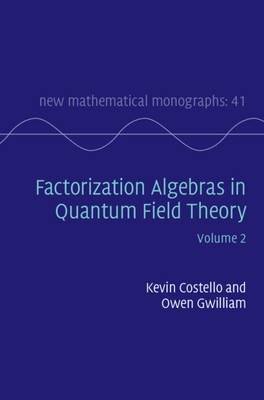
- We will send in 10–14 business days.
- Author: Kevin Costello
- Publisher: Cambridge University Press
- ISBN-10: 1107163153
- ISBN-13: 9781107163157
- Format: 15.2 x 22.9 x 2.7 cm, hardcover
- Language: English
- SAVE -10% with code: EXTRA
Factorization Algebras in Quantum Field Theory: Volume 2 (e-book) (used book) | bookbook.eu
Reviews
Description
Factorization algebras are local-to-global objects that play a role in classical and quantum field theory that is similar to the role of sheaves in geometry: they conveniently organize complicated information. Their local structure encompasses examples like associative and vertex algebras; in these examples, their global structure encompasses Hochschild homology and conformal blocks. In this second volume, the authors show how factorization algebras arise from interacting field theories, both classical and quantum, and how they encode essential information such as operator product expansions, Noether currents, and anomalies. Along with a systematic reworking of the Batalin-Vilkovisky formalism via derived geometry and factorization algebras, this book offers concrete examples from physics, ranging from angular momentum and Virasoro symmetries to a five-dimensional gauge theory.
EXTRA 10 % discount with code: EXTRA
The promotion ends in 16d.21:33:15
The discount code is valid when purchasing from 10 €. Discounts do not stack.
- Author: Kevin Costello
- Publisher: Cambridge University Press
- ISBN-10: 1107163153
- ISBN-13: 9781107163157
- Format: 15.2 x 22.9 x 2.7 cm, hardcover
- Language: English English
Factorization algebras are local-to-global objects that play a role in classical and quantum field theory that is similar to the role of sheaves in geometry: they conveniently organize complicated information. Their local structure encompasses examples like associative and vertex algebras; in these examples, their global structure encompasses Hochschild homology and conformal blocks. In this second volume, the authors show how factorization algebras arise from interacting field theories, both classical and quantum, and how they encode essential information such as operator product expansions, Noether currents, and anomalies. Along with a systematic reworking of the Batalin-Vilkovisky formalism via derived geometry and factorization algebras, this book offers concrete examples from physics, ranging from angular momentum and Virasoro symmetries to a five-dimensional gauge theory.


Reviews